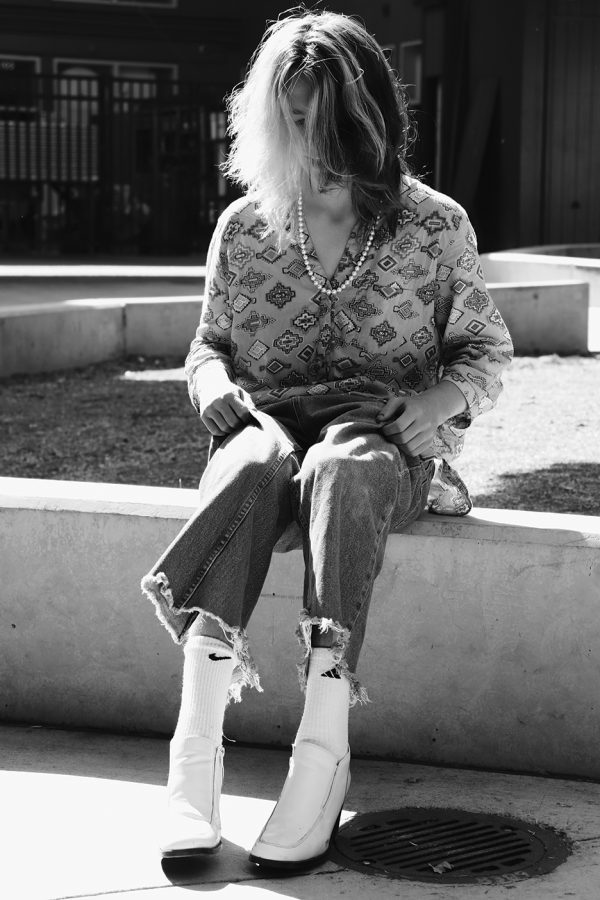“Boys Will Be Boys”
What to wear; which sport to play; when to cry; who to date. At what point does toxic masculinity take over?

With all the terrible comments you hear … you just learn to brush it off,” sophomore Brian Stewart said. Laughing, belittling comments and demoralizing language sung throughout Paly affect the many boys, promoting an environment surrounded by toxic masculinity.
Toxic masculinity is the idea of men conforming to stereotypical alpha male roles, hiding some of their true personality and becoming hypercompetitive. Weaving its way into our culture, boys and men follow stereotypes about what it is to be male, perpetuating negative aspects of our society from homophobia to hiding emotions all together.
There is a fine line between masculinity and toxic masculinity. Masculinity can be explained as qualities and attributes of any kind, which can be held by anyone identifying as a man. It becomes this phrase of ‘toxic masculinity’ when these qualities and behaviors become an exclusive set of characteristics that men believe they themselves should have, or others believe they need to have in order to be masculine. Freshman Aiden Murphy strongly believes there is a distinction between these terms. “For me, there’s a big difference between masculinity and toxic masculinity,” Murphy said. “As long as you’re comfortable with yourself, you can always be masculine.”
Most people assume the traditional belief of masculine implies having power and showing no sign of weakness, however, Murphy believes it is the opposite. He believes toxic masculinity is a sign of weakness. “For me, [hypermasculine guys] are not comfortable with themselves,” Murphy said. “If [guys] see someone express themselves in any way that’s not ‘masculine,’ they take their anger out on them because they aren’t able to express themselves yet.”

Society’s assumption of how all men should act often pressures men to hide any emotion to prevent being seen as anything but “tough.” Despite how men might look on the outside, senior Ryan Lykken explains that they do, in fact, have an emotional side too.
“There’s always the quote that boys don’t cry, but deep down inside, most guys are pretty sentimental,” Lykken said. “A lot of them often break down and are not just big, strong guys.”
Senior Cole Sturino believes this stereotype that men don’t show emotion is taught to them from childhood. “[Boys are] taught that [they are] only really allowed to express anger or happiness,” Sturino said. “I have a harder time expressing what I feel.”
With the competitive male nature challenging the validity of many individuals, the definition of masculinity is often obscured. “The only thing that defines someone as a man is if they identify themselves as a man,” Sturino said. “Having certain traits or not doesn’t really make them more of a man than somebody else.”
Similarly, senior David Gormley believes in the idea that the best definition of masculinity is no definition. “You’re putting everyone in a box,” Gormley said. “It makes people feel like they have to be a certain way.” Definition or not, masculinity holds no boundaries.
“There’s always the quote that boys don’t cry, but deep down inside, most guys are pretty sentimental,”
Not only that, toxic masculinity has a huge impact on how males dress each day, often stopping many from presenting themselves how they want to because of the negative impacts of society.
In his first year of high school, Murphy has already experienced being called out for his style due to the fact that it does not fit the masculine stereotype. “Get used to seeing something that you haven’t seen before…because I dress a little bit more feminine,” Murphy said. “Sometimes I get called gay slurs, just because that’s how people react to it; that’s how they take it out.”
Sophomore Brian Stewart has also experienced his fair share of inappropriate comments about how he chooses to present himself. To many, his painted nails stand out in his everyday outfits. “People at school will make a comment that reinforces gender norms,” Stewart said. “In my eyes, they seem jealous just because I like to express myself the way I do.”
From all of his experiences, Stewart has found a simple but impactful solution to the negativity he receives. “At this point, I don’t really care what they think,” Stewart said. ”You should be who you are.”
Appearance extends beyond clothing, and especially as a teenager, toxic masculinity adds to the difficulty of achieving the most stereotypically ideal body. For some, that means losing or gaining weight. “When I was younger, everyone used to call me skinny,” Lykken said. “[People would say] ‘get in the weight room’, ‘eat some food.’”
Lykken has been playing this musical instrument for the past eight years. “I think [that] as I matured, I see it as more a cool thing that nobody really does,” Lykken said. “When I was younger, freshman year or something, I would try not to tell people just because I felt like it’s not a male-dominated thing.”
These gender norms often define what activities men believe to be acceptable to share with one another. Lykken has his own hobbies that many would not associate him with. In addition to basketball, he plays the violin.
Although women do not experience this type of toxicity, they see it on campus every day. Junior Evie Kramer notices how men do not feel as comfortable because of the masculine standard that has been built up. “I’m at a disadvantage when my classmates feel like they can’t be their true selves,” Kramer said. “It makes classrooms feel unsafe and leads to an overall toxic environment for them and sometimes even us. I hope that Paly and our society as a whole can re-look at what we consider to be the ‘perfect’ man.”
Gormley believes change is not only inevitable but is already happening. “Over the last four years that I’ve been at this school, people have become a lot more aware,” Gormley said. “Boys are more aware of how they’re perceived. It’s improving.”
However, Gormley believes that the root of the issue is in how each individual is raised and educated. “We need to educate people that being manly doesn’t have to mean being a bully or being abusive or aggressive,” Gormley said. “It’s just being who you are.”
Murphy believes that expressing your true self is important, and to do this, the Paly community needs to see more male students expressing themselves. “If we just bring in this standard and get guys used to seeing things that they haven’t seen before, it would make everyone feel more comfortable expressing themselves,” Murphy said.

The negative reactions coming from those who surround boys and men creates a serious issue of self-care and failure to recognize how to support oneself, mentally and physically. According to the World Health Organization, starting at 50 years old, men tend to be disproportionately affected by mental illnesses due to not engaging in self-care practices. They believe that changes need to be made to begin providing help to men, and acceptance to participating in self-care starts with eliminating these cliche barriers that prevent men from doing so. They say it will allow men to feel more accepted for who they are, and not feel pressured to conform to this “alpha” male character.
Lykken believes that reaching this acceptance could be simple. “Just don’t judge people,” Lykken said. “Everyone has their own struggles, especially men trying to be confident. It’s a pretty hard thing in this day and age, so just keep your thoughts to yourself and try to be positive.”
Print Issue
Please click on the three vertical dots on the top right-hand side corner, then select “Two page view.”

2020-2021 - Staff Writer
2021-2022 - Creative Advisor
I joined Cmag to express my creativity within a magazine. I enjoy that we all come together...

2021-2022 - Staff Writer
2022-2023 - Editor-In-Chief
I joined C Mag because I really enjoy design and arts, and the creativity it comes with it....











